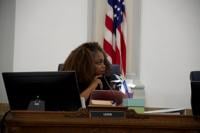The Denver City Council on Monday will consider approving a ballot measure that would let voters decide on a sales tax hike that, if approved, would fund more affordable housing options across the city.
The proposed 0.5-point tax hike, proposed by Mayor Mike Johnston, seeks to generate $100 million in revenue to support new affordable housing units. If approved the council approves, then voters will have the final say in November.
In addition to using existing funds for 20,000 affordable housing units, Johnston said the sales tax hike would fund an additional 20,000 affordable units over 10 years.
During last week's City Council meeting, councilmembers sparred over who the sales tax increase would benefit. And, through tedious discussion, councilmembers prepared more than 10 amendments to the proposed measure.
Councilmember Shontel Lewis, who sponsored the sales tax hike, introduced four amendments. One sought to prohibit spending from the new revenue to projects for households who earn 80% to 120% of the area median income (AMI) — barring a “demonstrated community housing need.”
Instead, Lewis wants the money to flow to projects benefitting residents at the 80% or lower mark.
“The purpose of this amendment is to avoid use of public money to subsidize building of rental housing that is currently market rate by lowering the AMI threshold but allowing it to 'float' up to 100% of AMI depending on market conditions,” she said.
Some councilmembers posed opposition to the proposal.
Councilmember Flor Alvidrez said there appears to be something of a “disconnect” between market rate units and 100% area median income.
Joining Alvidrez, Councilmember Amanda Sawyer said the bill, as written, actually supports the “missing middle” segment of housing — meaning housing for those in an 80% to 120% AMI bracket.
“The affordable Denver initiative is meant to address that demonstrated need, which is higher than 80% AMI,” Sawyer said. “And so if it's not going to address that, it's not going to do what we have been telling people it's going to do, and I can't support that.”
Opposition of the proposal also include former former Denver Mayor Wellington Webb, who said despite the measure's good nature, the timing of it is wrong.
Ultimately, Denver voters will decide the fate of the mayor's tax hike proposal, as well as another sales tax increase that the City Council already sent to the ballot. Combined, the two proposals would generate close to $200 million annually and make Denver the city with the highest sales tax in the metropolis and Northern Colorado, rivaling only Colorado's resort and mountain towns.
In other action Monday, the council will consider:
- Three master purchase order contracts totaling $25.5 million to acquire landscaping equipment for city parks and golf courses. Councilmember Sarah Parady motioned to postpone the votes twice, citing concerns for continued use of gas powered equipment.
- A $1.7 million resolution with Downtown Denver Partnership to continue addressing negative impacts of the COVID-19 pandemic in Denver’s economy.
- A $5 million grant agreement with the U.S. Department of Agriculture (USDA) Forest Service Rocky Mountain Region. This money is allocated to the Inflations Reduction Act Denver Community Tree Planting Initiative Expansion program to plant trees and reduce heat in low canopy neighborhoods.
- A $4.3 million contract with Harmon Infrastructure to construct new sidewalks, ADA ramps, roadway improvements and storm drainage improvements in the Mar Lee neighborhood.
- November ballot measure for whether debt of the City and County of Denver to be used by and on behalf of the Denver Downtown Development Authority ("DDDA"), towards costs of public facilities, infrastructure, and other improvements to public or private property in accordance with projects described in the DDDA Plan of Development.
Denver Gazette reporter Alex Edwards contributed to this report.






